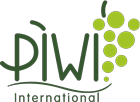Fungus-resistant hybrid grapes could be the answer to environmentally sustainable winemaking.
Hello, Felicia! Undoubtedly, we were more than happy to see 2020 come to a close, but the year end did bring about a few silver linings. In the wine world, one such event was the official approval of new Piwi grape varietal, Felicia.
Short for “pilzwiderstandsfähig” (German for “fungus resistant”), Piwis are special hybrid crossings between vitis vinifera, the common European grape vine, and the mainly North American vitis species. While hybrid grapes are far from new, Piwis have gained attention in recent years thanks to the increased interest in and greater push for environmentally sustainable agriculture.
As native North American grape species are resistant to a variety of maladies their European counterparts are susceptible to, these hybrids carry a natural resistance to fungal diseases, reducing or even eliminating the need for spraying. This, in turn, significantly reduces the negative impact on the environment: less usage of chemical fungicides, lower emissions of carbon monoxide from tractors and a reduction in compacting of vineyard soils when tractors run over them, thus encouraging more micro-organisms in the soil.
There is not only an environmental upside to adopting Piwis. Jörg Philipp, Asia representative of Piwi International, a global association for the promotion of fungus-resistant grape varieties, lays down its financial advantages.
“Less usage of costly treatments and less need for driving through the vineyards (translating to savings of time, fuel and machinery input) lowers the cost of wine production in a significant way. Economically, the usage of Piwis is an important cost reducer.”
read more

